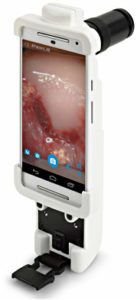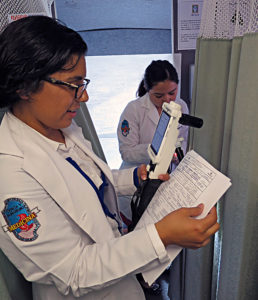 In 2014, MobileODT won first prize in the Vodafone Americas Foundation’s Wireless Innovation Project for its smartphone-based technology that converts the camera of the phone into a device capable of providing the evidence clinicians need to catch cancer before it develops. With its WIP prize, MobileODT’s first priority was to use its technology to fight cervical cancer.
In 2014, MobileODT won first prize in the Vodafone Americas Foundation’s Wireless Innovation Project for its smartphone-based technology that converts the camera of the phone into a device capable of providing the evidence clinicians need to catch cancer before it develops. With its WIP prize, MobileODT’s first priority was to use its technology to fight cervical cancer.
Cervical cancer is responsible for the deaths of more than 270,000 people annually, about 85 percent of whom live in low- or middle-income countries, and it is a leading cause of death for women in developing nations.
MobileODT’s solutions leverage the ubiquity of smartphones to replace complex and expensive systems with simplicity and affordability. Led by Ariel Beery, Dr. David Levitz, and Amit Safir, MobileODT created advanced optical technology to turn smartphones into a mobile, easy-to-use point-of-care tool called the Enhanced Visual Assessment (or EVA) System. The EVA System can help health providers detect cancer and capture biomedical images for diagnostic and other analytical purposes. By creating a database of images of cancer, more medical technicians and doctors will have access to learn from and compare diagnoses. An integrated app tracks patient information and images, and a simple mobile data connection allows access to images for review in real time or during scheduled consultations with remote experts.
 MobileODT’s low-cost and easy to use technology is potentially game-changing to help reduce cervical cancer. There are more than 700 million screenings per year for this disease. Since winning the WIP grant from the Vodafone Americas Foundation, MobileODT’s Cervical Cancer Screening System has been met with enthusiastic response in 21 countries around the world. The WIP funds helped establish MobileODT’s partnership with Bruce Kahn, M.D. at Scripps Clinic in San Diego and clinicians at Fronteras Unidas Pro Salud in Mexico, a civic organization with tools to provide medical and educational services on reproductive health for areas of Tijuana that lack access to medical services. Together, they are testing several models of care using Mobile ODT technology.
MobileODT’s low-cost and easy to use technology is potentially game-changing to help reduce cervical cancer. There are more than 700 million screenings per year for this disease. Since winning the WIP grant from the Vodafone Americas Foundation, MobileODT’s Cervical Cancer Screening System has been met with enthusiastic response in 21 countries around the world. The WIP funds helped establish MobileODT’s partnership with Bruce Kahn, M.D. at Scripps Clinic in San Diego and clinicians at Fronteras Unidas Pro Salud in Mexico, a civic organization with tools to provide medical and educational services on reproductive health for areas of Tijuana that lack access to medical services. Together, they are testing several models of care using Mobile ODT technology.
Over the past few months, MobileODT has been expanding its reach, working to train a group of Afghani obstetricians in the use of the EVA System. This could make a big difference in Afghanistan, which currently has no cervical cancer screening program in place. Through video conferencing, Dr. Kahn and the MobileODT team are conducting training sessions with four obstetricians in Jalalabad, Afghanistan. Once the doctors are confidently trained, the hope is that they can provide similar training to other providers in Afghanistan to expand the screening program, and help prevent unnecessary deaths of Afghani women. They also hope to establish a model through which other academic medical centers can work with partner organizations in other low resource settings to reduce the incidence of cervical cancer in other regions.
The Vodafone Americas Foundation is proud to support MobileODT’s efforts to fight cervical cancer and help improve the lives of women around the world. Learning more about the Wireless Innovation Project (WIP).